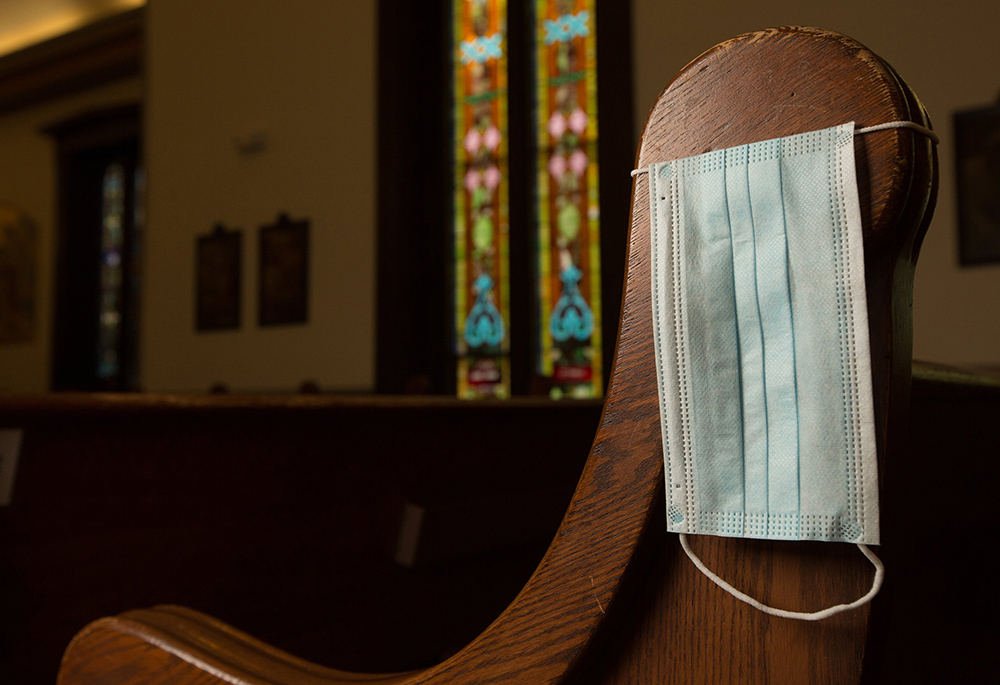
In this illustration photo, a disposable medical mask hangs on the side of a church pew. (CNS/The Catholic Spirit/Dave Hrbacek)
Some U.S. Catholic priests have peddled conspiracy theories about microchips in vaccines and power-hungry global cabals exploiting the coronavirus pandemic to institute a one-world government. Others have spread blatant untruths about COVID-19, telling their flocks and online audiences that the pandemic is not real, that the vaccines are immoral and could even kill them.
"There is evidence that the jab is harmful even deadly," Fr. Paul Kubista of the Archdiocese of St. Paul and Minneapolis wrote in his parish bulletin last October.
"If you took the Coronavirus-19 'vaccine' you will probably be dead in two years," Fr. David Nix, a priest in the Archdiocese of Denver with a large social media following, wrote on his Facebook page last summer.
A few bishops have tried to stop their clergy from spreading such misinformation — most of which originates in right-wing echo chambers — but others have not made any public statements to correct the record. A handful of prelates have repeated the misinformation themselves.
"It doesn't do a church that is in a credibility crisis any favors to have these people trying to make a name for themselves by being contrarian on Twitter," said Natalia Imperatori-Lee, a religious studies professor at Manhattan College.
Imperatori-Lee told NCR that she was "more disappointed than mad" that several bishops "cannot seem to be forceful" on a public health matter that impacts the common good and the Catholic Church's imperative to protect the most vulnerable in society.
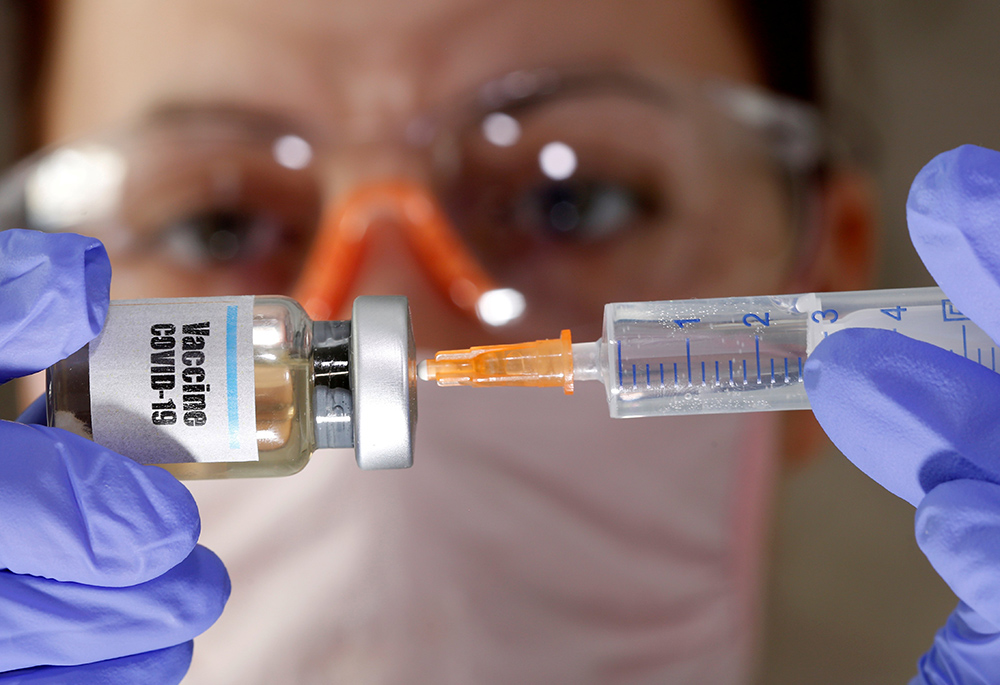
A woman holds a small bottle labeled "Vaccine COVID-19" in this illustration photo. (CNS/Reuters/Dado Ruvic)
"I just feel like we have really lost sight of that, not only with misinformation about COVID vaccines and public health mandates, but even in the inability to be forthright about it, with [the bishops] looking the other way and deciding not to get involved," she said. "It feels like a sin of omission, of failing to stand up for the vulnerable."
Other observers, including canon lawyers and public health experts, also told NCR that they think bishops could come out stronger when priests share false information about the COVID-19 pandemic from the pulpit, on their personal blogs or via social media platforms like Twitter and Facebook.
"One of the classical definitions of a bishop in Latin was defensor civitatis, which refers to one who is in charge of defending the community, especially in times of war, emergency and social political crisis. That is something that seems to me many of them have lost," said Massimo Faggioli, a theologian and church historian at Villanova University.
Faggioli suggested that the American individualistic idea of freedom has clouded some bishops' understandings of their role to defend the common good, both for Catholics and non-Catholics.
Said Faggioli: "For me, the most serious problem is that they have forgotten what it means to be a bishop in the Catholic Church, which is different than being the corporate manager in a firm that is only interested in what's good for the firm. That has been astonishing to me."
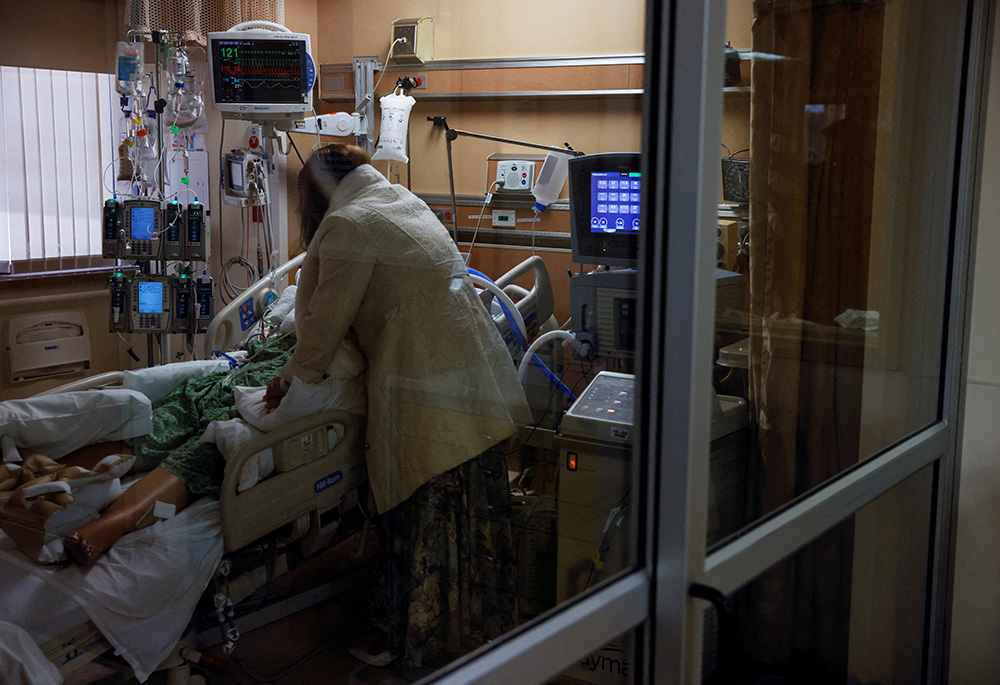
The mother of a COVID-19 patient stands at the bedside of the patient in the intensive care unit of the St. Mary Medical Center Feb. 1 in Apple Valley, California. (CNS/Reuters/Shannon Stapleton)
A deadly pandemic
As of Feb. 6, COVID-19 had killed more than 5 million people globally — with over 900,000 deaths in the United States — since the World Health Organization declared a pandemic in March 2020. The coronavirus is killing Americans at far higher rates than people in other wealthy nations.
In 2020 and 2021, the U.S. Food and Drug Administration offered emergency use authorizations for COVID-19 vaccines manufactured by Pfizer-BioNTech, Moderna and Johnson & Johnson.
Clinical trials and various studies have shown that the vaccines help protect against COVID-19 infection, and greatly reduce the odds of people becoming seriously ill to the point of hospitalization and death. The Pfizer-BioNTech and Moderna have both now received full FDA approval.
"The data on these vaccines is unequivocal. They keep people alive and keep them out of the hospital. That is an unequivocal scientific fact. Any doubt that exists here is manufactured," said Dr. Philip Landrigan, director of the Program for Global Public Health and the Common Good at Boston College.
Landrigan told NCR that priests put their parishioners and online supporters at risk by giving them information about the pandemic and vaccines that is not supported by science. He called on bishops to respond in those situations.
"Obviously this is a delicate issue because it pertains to governance in the church," Landrigan said. "But ultimately the bishop is the shepherd of his flock; that's why he carries the crozier. I think if a bishop realizes that one of his team is putting out information that's ultimately going to put people at risk, he has a responsibility to act and protect his flock."
Pope Francis, the Vatican, the U.S. Conference of Catholic Bishops and various state-level Catholic bishops' conferences have endorsed the vaccines, while acknowledging that some of the products made use of a decades-old fetal cell line in either production or lab testing.
Francis has suggested getting vaccinated is a moral obligation. The Vatican's Pontifical Academy for Life has publicly called out those who spread "malinformation" about the vaccines, calling their efforts "pure nonsense." And the U.S. bishops have said those who claim it is immoral to take the vaccines are offering "an inaccurate portrayal of Catholic moral teaching."
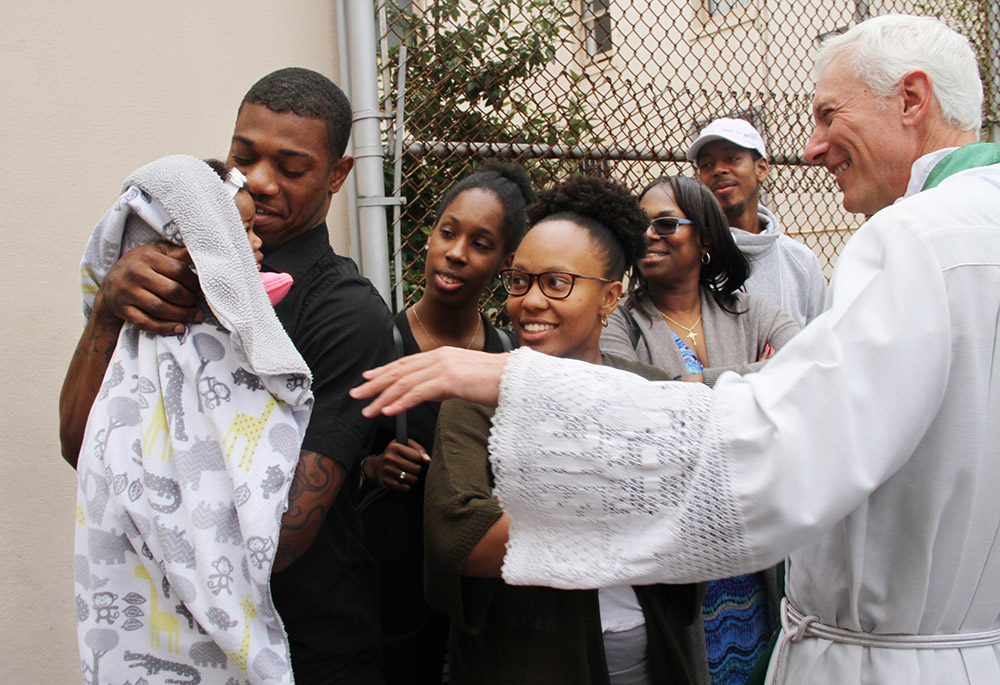
Fr. Joseph Illo, pastoral administrator of Star of the Sea Parish in San Francisco, greets parishioners after Mass July 2, 2017. (CNS/Catholic San Francisco/Valerie Schmalz)
Fringe opinions
But some priests have eschewed the scientific data and official church guidance in favor of medical and ecclesial outliers whose views are amplified in conservative media, right-wing podcasts, social media platforms and fringe far-right outlets.
"In my opinion, the vaccines hardly work, but they do not need to work. The virus is taking its natural course of becoming more easily transmitted but less virulent," Fr. Joseph Illo, a priest of the Archdiocese of San Francisco, wrote Jan. 10 on his blog.
San Francisco Archbishop Salvatore Cordileone, who revealed in a news interview that he is not vaccinated, also incorrectly said that the COVID-19 vaccines "are not really vaccines," a common talking point in conservative media.
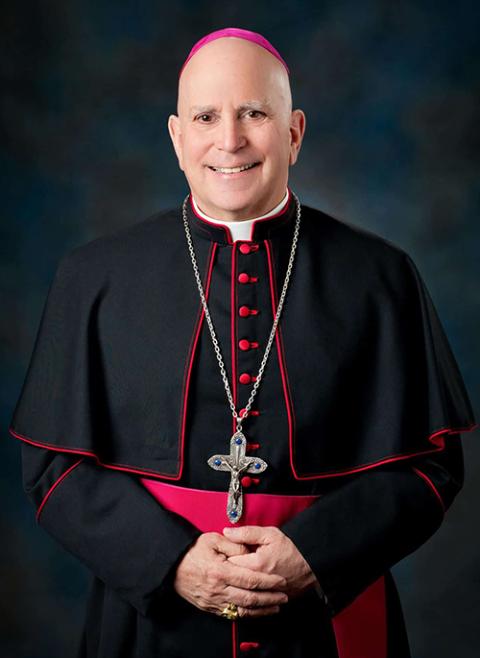
Denver Archbishop Samuel Aquila is pictured in an undated photo. (CNS/Courtesy of Archdiocese of Denver)
In Denver, Nix — a controversial priest who has clashed with Archbishop Samuel Aquila — has also spread misinformation about vaccines and right-wing conspiracy theories such as "The Great Reset," the idea that malevolent global elites are using the pandemic to install a new world order that will abolish private property and religion.
In December, Fr. David Nolan, a priest of the Priestly Fraternity of St. Peter who ministers at Our Lady of Mount Carmel Church in Littleton, Colorado, spread similar misinformation during a homily. YouTube removed video of the homily due to COVID-19 misinformation. In 2020, Nolan told parishioners to disobey orders from church and civic leaders about wearing masks at Mass, which prompted a "review" by the Denver Archdiocese and the priestly fraternity.
Aquila is vaccinated. But he also signed onto a public letter in August 2021 urging priests in Colorado to sign religious exemption letters for Catholics who do not wish to be vaccinated for COVID-19, and has not publicly commented on priests in his archdiocese who spread misinformation about the pandemic and the vaccines. The Denver Archdiocese did not return a message seeking comment for this story.
A spokesman for the San Francisco Archdiocese told the San Francisco Chronicle in July 2020 — after Illo chastised parishioners who were not attending Mass for choosing "safety above sacraments" — that the archdiocese did not monitor pastors' homilies, bulletins or blog posts. The San Francisco Archdiocese also did not return a message from NCR seeking comment for this story.
Meanwhile, Bishop Joseph Strickland of Tyler, Texas, has misrepresented COVID-19 vaccines, which he has described on Twitter as "abortion tainted" and made possible because humans "were murdered in abortion to help produce" them. He has also tweeted anti-vaccination videos and declared that he would "rather die than benefit from anything produced by using an aborted child."
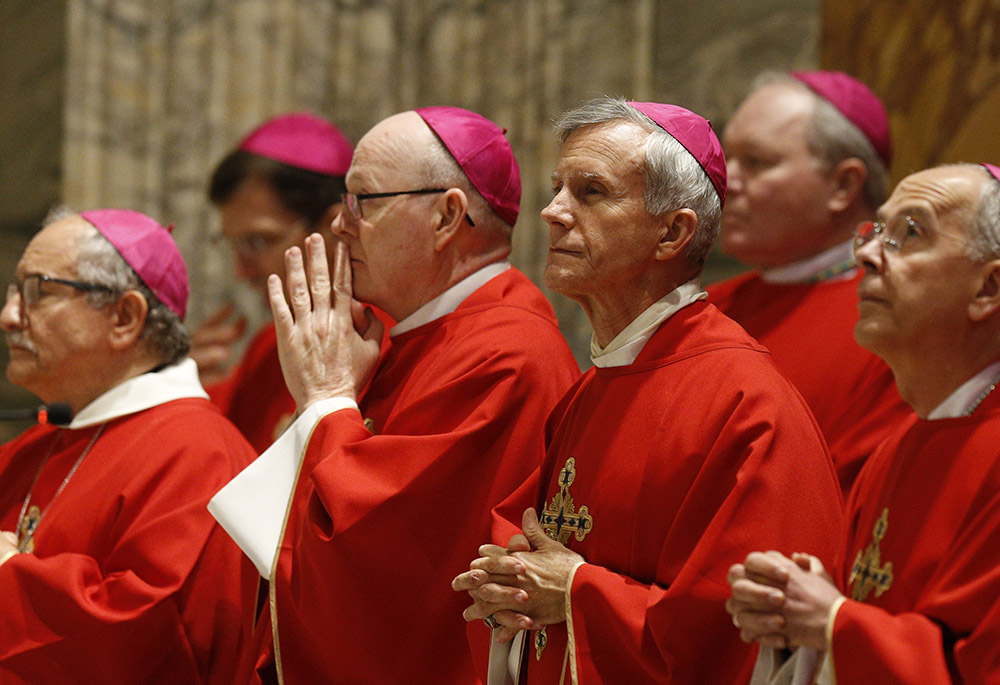
Bishop Joseph Strickland of Tyler, Texas, and other U.S. bishops from Arkansas, Oklahoma and Texas concelebrate Mass Jan. 21, 2020, at the Basilica of St. Paul Outside the Walls in Rome. The bishops were making their "ad limina" visits to the Vatican to report on the status of their dioceses to the pope and Vatican officials. (CNS/Paul Haring)
In fact, none of the COVID-19 vaccines contain aborted fetal cells. Fetal cell lines — which are grown in a laboratory based on cells collected decades ago — were used in the development and research of some of the products. The U.S. bishops have called the Pfizer and Moderna vaccines' connection to abortion "relatively remote" and have said it is not "immoral to be vaccinated with them."
Strickland has tweeted support for a Vermont priest who disobeyed an order from his bishop to be vaccinated or to wear a mask and submit to regular testing. Strickland has also shared missives written by Archbishop Carlo Maria Viganò, the former Vatican ambassador to the United States who has peddled similar misinformation about the pandemic and the Great Reset conspiracy theory.
On Jan. 31, the head of Italy's military ordinariate urged service members and police in that country to ignore Viganò's call for them to disobey orders to enforce measures aimed at stemming the virus' spread.
"This is one of the effects of digital social media," Faggioli said. "Once you might have had bishops who attempted to do this, but it would have taken a letter or a newspaper article for them to get their message out."
Faggioli also suggested that "a fundamental lack of accountability" for bishops contributes to the situation where some prelates seemingly look the other way on priests who spread misinformation, or who disseminate it themselves.
"Honestly it should be up to the metropolitan bishops to say something because the Vatican cannot police the U.S. church as much as would be actually needed," he said.
In the church, metropolitans are archbishops, usually of major cities, who have some limited oversight over bishops in their ecclesiastical provinces.
Advertisement
Fighting misinformation
Some bishops in the United States have tried to rein in their clergy from spreading misinformation about the pandemic.
In a private letter to local priests and deacons, which NCR obtained, Bishop David Bonnar of Youngstown, Ohio, wrote on Jan. 19 that he had recently learned that some clergy were using their homilies to speak about vaccines, political ideologies and partisan agendas "at the expense of God's word." Bonnar said he would "no longer condone abuses" in that regard.
"If I am made aware that any clergy is using the pulpit to promote political opinions and denouncing current Church teaching, I will have no other recourse than to revoke their faculty to preach," Bonnar wrote.
Twice in the last two years, Archbishop Bernard Hebda of Minneapolis and St. Paul, Minnesota, released public statements in response to parish priests who spread misinformation claiming COVID-19 deaths were "inflated" and that the virus was manufactured and spread on purpose. Hebda's statements included critiques from public health experts and emphasized that the pulpit was not an appropriate venue for a priest to offer his personal opinions.
Fr. James Altman, then-pastor at St. James the Less Catholic Church in La Crosse, Wisconsin, is seen in his YouTube video. In the clip he attacks Catholics who are Democrats. Bishop William Callahan removed him as pastor July 9, 2021. (CNS/YouTube screengrab)
In La Crosse, Wisconsin, Bishop William Callahan in July 2021 removed the controversial priest Fr. James Altman from his pastor's position after Altman used online videos, parish bulletins and homilies to disseminate partisan political ideology, including misinformation about vaccines and the pandemic. Callahan restricted Altman from preaching, though that has not stopped the firebrand priest, who remains popular in ultraconservative Catholic circles, from speaking out in far-right venues.
"If you have 10,000 people following you, and they're outside the chancery and it's causing all kinds of division in the diocese, then well you got to do something. The question is what do you do?" said Robert Flummerfelt, a Las Vegas-based canon lawyer.
Flummerfelt told NCR that bishops have the canonical authority to order their priests to stop disseminating misinformation related to the pandemic. They can impose a penal precept and remove a priest's faculties to preach. But he said the country's polarized political climate — in which opinions related to the pandemic often reflect partisan loyalties — puts the bishop in a "tough spot."
"Does the bishop have the authority to impose a penal precept? Of course he does. Should he do it? He might be in a 'win the battle, lose the war' situation if he does," said Flummerfelt, who argued that imposing that kind of discipline risks causing more division.
"Because of where our country is, it just makes everything political," he said.
Imperatori-Lee, of Manhattan College, acknowledged there can be legitimate reasons for a bishop's "prudential silence," though she added that prelates are also in a position to bridge differences.
"You hear people decrying the polarization in our church and nation, but something like the common good should be a place where we can build bridges, not leave people to their own devices," she said.
"The fact that any of this has become a political statement is a sad reflection on the state of the nation, and this is where the bishops could provide an alternate example."






